Comédie!
I'm still at the stage in Korea where I'm not necessarily clear on exactly where we are going until I get there, so I was surprised to find that the Cultural Center was perched on a hill overlooking the U.N. Cemetery which I've seen in passing before, but have yet to actually visit despite it being on my list of places to go. On a clear day the views over the city must be good - but this wasn't quite one of them. Busan has very few perfectly clear days in my experience.
The complex itself seems impressive, though I had little time to look around. There's a small park on one side of the grounds, for once reminiscent of a proper English park rather than being a codeword for 'somewhere that hasn't been built on yet'. The large buildings and their positioning relative to the city suggest that this is a place where culture is taken seriously, so Busan did well there.
The production itself seemed to begin in the manner one might expect of a traditional farce. A theft is attempted before the stage gives way to a party, complete with live jazz musicians who play at various points through the performance. The performers do well to bring the supposed 1960's atmosphere to life, but there came a point at which I began to wonder whether it was really funny. Korean humour is not, in my experience, generally noted for its subtlety, and if I, coming from a country noted for its sometimes dark, dry and often odd sense of humour, didn't get it, I wondered how the Koreans were faring. It's tempting as an English person sat feet away from fifteen French people to feel some affinity towards them - we are geographical neighbours after all - but by the time proceedings drew to a close, I was questioning the cultural divide between us was larger than the narrowness of 'La Manche' suggested.
There was a question and answer session after the end, and my wife wondered whether we should stay. It had at least been interesting, and for an event subtitled 'Defining the Boundaries of Theatre', this goal had certainly been attained in the mixing of a stage-play and live jazz music in a performance with an apparently unapologetically disjointed narrative, titled and pitched as something it might not quite be. I'm not going to pretend though - sometimes you just have to call it - it didn't click for me. Maybe that's because it strayed into "L'art pour l'art" - Art for Art's Sake - and being from both a working class and science background I need to find meaning in what I see. Perhaps I'm just not qualified to offer a critique.
The first question was not so much a question as a statement - a man stood up and said that the performance was called 'Comedy' and it was pitched as a comedy, but it didn't seem funny. A horrific silence momentarily descended over the theatre as the translator faced the reality of having to translate that. I wondered whether the BIPAF organisers had been remiss in their descriptions, because they certainly had been when they told a friend of ours it was fine to bring her ten-year old daughter - possible drug-taking, nudity in obvious silhouette behind a lit screen, simulated sex in closets, questionable acts of intimacy in public, cigar smoke wafting over the audience, all mixed with alcohol abuse and stabbings with scissors, might not be what you would ordinary choose to expose your child to. Personally, most of that's more my level, and I always welcome public displays of suggested homosexuality in the hope it encourages greater tolerance. But the director stood his ground, and follow-up questions pressed the issue. Sat in the second row, I felt trapped in the middle of a cultural clash, the mood of which might well be dangerously deteriorating, and even though there were fifteen performers - the most foreigners I've ever seen together in my time in Korea - I comforted myself in the belief that if they rushed us the remaining audience could probably fight them off.
The truth is it must be hard to face the cultural divide after working so hard for ninety minutes, and I really felt for them. It seems the French just can't catch a break in this country. Still, there is one stereotype in which English people radically differ from their French neighbours - our supposed 'stiff-upper lip' forces us to hide our true feelings in the face of adversity - something I find to be an extremely important survival attribute in Korea. French people on the other hand, have a rather delightful if possibly misunderstood reputation for not always hiding their unhappiness. I noticed immediately once the questions began, but said nothing. The Koreans in our party noticed anyway. Somehow the photo I took of the question and answer session reminded me of Leonardo da Vinci's The Last Supper, and the mood was about as ominous.
5,600 miles is a long way to travel to be told you're not funny. I know.
The clash of cultures continued as Korea's hierarchical society next wanted each performer to state their age. One lady answered 'twelve'. Bravo!
Fortunately some less controversial questions and statements were made, and then the mood was somewhat salvaged by the Asian performer on the stage. She was asked via the translator if she was Korean. Logically, the chances of this were astronomically low despite the Korean-Wave belief that Koreans might in fact be secretly involved in every facet of society overseas. But she was. This was a major revelation for almost everyone concerned, including it seemed, our Korean translator who had seemed to struggle in her role. The Korean-French performer then largely took over the answering of questions, the mood warmed up, everyone left more placated and a fight was avoided.
Busanmike.blogspot.com
Twitter: @BusanMike
YouTube: /BusanMikeVideo
Flickr: /busanmike


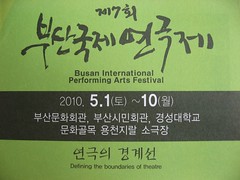
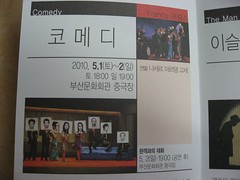


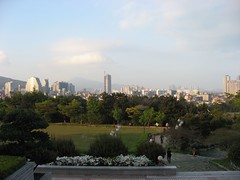
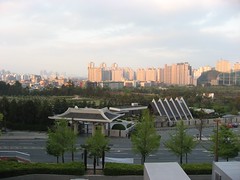
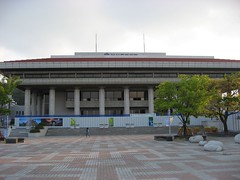

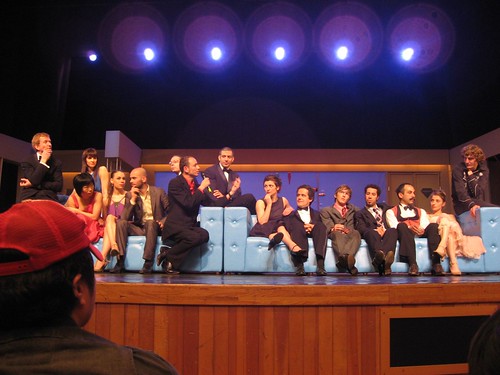






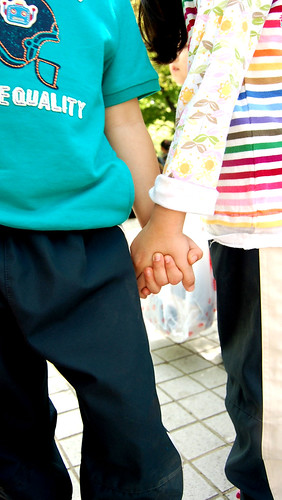






 RSS Feed
RSS Feed
Recent comments